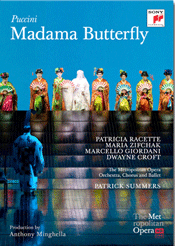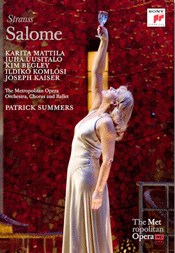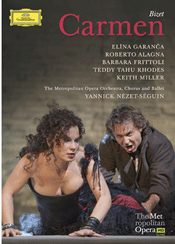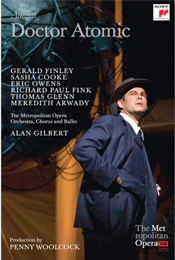Instead of adolescents or youngsters and their parents shambling in to see the latest animated feature or some popular action/horror movie, a polite, more “senior” audience appears (often quite early) for a live simulcast in high-definition from the Metropolitan Opera’s home in Lincoln Center. Earlier attempts of this sort of media exploration had never really been much of a success, making the “Met Live in HD” venture something of a risk. In this case, the bet has paid off, and the so-called moviecasts have become a phenomenon, at least in the world of opera. The number of presentations has increased, the number of theaters hosting the shows has multiplied, and later “encore” showings are part of the program now as well. That first live moviecast remains the biggest draw, as most anyone who has attended one of the movie theater showings can attest that somehow at least some of the energy and atmosphere of the actual live performance manages to get conveyed, even in some suburban multiplex hundreds and hundreds of miles from NYC.
The fact that these moviecasts end up on PBS within a few months (although erratically scheduled) and then eventually on store shelves in DVD format has done nothing to slow the program’s expansion and success. Viewing five of the Met Live in HD moviecasts in their DVD equivalents offers reasons for that. Although the DVDs have at least some of the intermission features and begin with the backstage introductions by one or another of the Met’s singing stars, a true “live” feeling is absent once the opera proper begins. The viewer is left with somewhat ordinary operatic DVD viewing — with the expected variable successes in singing, production, and musical performance. The optimal way to enjoy these performances would have been to see them at Lincoln Center, but the definite next best would be the live HD moviecast. After that, the magic dissipates.
Start with the Sony DVD of the Met Live in HD series’s Simon Boccanegra, filmed on February 6, 2010. In a brief interview conducted by Renee Fleming, conductor James Levine speaks of his high regard for the opera and suggests it is no surprise to him that tenor Placido Domingo would, at this point in his career, take on the title role, which Verdi wrote for a baritone. For all the talk of the “baritonal” timbre of Domingo’s voice, what is striking about his vocalism as Boccanegra is how bright and high-placed he makes so much of the music for his character sound. Duets with a low voice such as that of James Morris, as Boccanegra’s adversary Fiesco, have a tint of Otello and Iago facing off. What cannot be questioned is Domingo’s identification with the role, where he is able to indulge his passion for enduring emotional, if not physical, pain on stage. He projects dignity at all times, however, which strengthens his portrayal. Up against a wily veteran such as Morris, Domingo raises this performance to a high level. The rest of the cast does not reach that elevation. A fine soprano, Adrianne Pieczonka is miscast as Amelia, her solid, hefty soprano sounding blustery and forced. A favorite tenor of the Met, Marcello Giordani is at his best when he can power through a role, and the male ingÈnue role of Gabriele Adorno gives him few such opportunities. The production of Giancarlo del Monaco would have been at home at the Metropolitan a quarter century ago. Handsome, detailed, almost monolithic in its high walls and expanse, it would be perfectly appropriate for an opera with a more believable narrative. The greatness of the opera, however, is not in its plot but in its score, which Levine and his orchestra play with taste and expertise. Still, when Morris and Domingo are not on stage, the performance drags.

Not dragging at all is the Madama Butterfly in the late Anthony Minghella’s acclaimed production. Here a viewer can regret the TV director’s propensity for close-ups, as the total stage picture offers the greatest reward. Minghella, lighting designer Peter Mumford and set designer Michael Levine put on a master class of how to create dramatically cogent and visually arresting stage pictures on a stark set, through color and effective use of minimal props. The one controversy of the production centered on the decision to use a puppet for Sorrow, Butterfly’s child (puppet theater being a cultural and theatrical tradition in Japan). Viewers will make up their own minds about this, but for your reviewer, the puppet fits perfectly into the theatrical techniques of the entire show and has an impact often absent from productions which use an older child than the libretto indicates.
A strong cast exhibits high professionalism, if lacking in the aura on inspiration that makes for truly great performances. Patricia Racette’s soprano can begin to wobble under pressure, and your reviewer, like some others, finds something external, or generic, about her acting. But this is one of her best total performances, no doubt. Much the same goes for Marcello Giordani, who gives us a strong portrayal of the classic very-Italian B. F Pinkerton. Dwayne Croft’s Sharpless and Maria Zifchak as Suzuki give fine support. Reliability would seem to be the key word for conductor Patrick Summers, but one only has to endure one less than reliably conducted performance to understand the virtues of a conductor such as Summers. He does well by Puccini’s magnificent score.

Summers has the baton again for the October 11th, 2008 recording of Richard Strauss’s Salome. One might have hoped for some more distinctive musical leadership. When Karita Mattila first took on this role at the Met in J¸rgen Flimm’s spooky, modern dress staging, she sang for Valery Gergiev, and the radio broadcast gave evidence of the visceral excitement of those performances. Years later, in 2008, Mattila is working with slightly less secure vocal resources, but the brazen aggression of her princess still makes for a startling show. She also had Bryn Terfel as her Jochannan in that earlier run. Here Juha Uusitalo takes the role, and he cannot match the stage charisma or vocal authority of Terfel. Some viewers may be grateful that neither Kim Begley as Herod nor IldikÛ KomlÛsi as Herodias overact in their roles, as singers in many another production have, but sometimes it is that extra element of risk that adds to the total frenzy a great Salome can produce. This production, therefore, ranks as respectable, rather than great. Too bad the cameras were not there in 2002, for that first run.

A strongly conducted performance appears in the Carmen, with Yannick NÈzet-SÈguin bringing out distinct colors and etching a sharp rhythmic profile. He has two superior leads — the well-established exuberance and commitment of tenor Roberto Alagna as Don JosÈ, and the warm, sensuous tones of mezzo El?na Garan?a. Often one reads references to the “clichÈs” of a Carmen portrayal, but any performance that doesn’t acknowledge what the libretto establishes — the sensuality and wildness that make Carmen stand out — won’t pass muster. Garan?a herself, even in a dark wig, doesn’t have to stretch to evoke this reputation, and the intelligence with which she sings the role cuts against any cry of “clichÈ.” In the key supporting role, Barbara Frittoli manages to be beautiful and yet clearly not much competition for the Carmen, especially as the soprano needs time to warm up and even then, a persistent beat appears in higher lines.
Richard Eyre’s staging was new to the Metropolitan when filmed in January 2010, and while far from innovative or evocative, the sets establish the sultry, threatening mood of the piece, and scene changes are easily accomplished. A performance of this quality reminds everyone of why this masterpiece never loses its appeal.
For all the above titles, numerous competitors on DVD might lay claim to being superior in one category or another. For John Adams’s Dr. Atomic, the only DVD competition also features Gerald Finley in the title role — the Peter Sellars staging of the premiere production (originally seen at San Francisco Opera, later filmed at De Nederlandse Opera). For the Metropolitan Opera , Penny Woodcock took over the production responsibility. Her work is more formal and naturalistic than what Sellars opted for, but it has enough stylization to support the atmospheric effects of Adams’s score. Seeing this opera again (your reviewer caught the premiere run in San Francisco, twice), the strengths seem just as distinctive as ever, but the weaknesses only grow more persistent. The libretto seems to be modeled on Nixon in China, with Oppenheimer a more sympathetic figure than Nixon, but just as troubled and conflicted, and with Kitty Oppenheimer (Sasha Cooke) being the equivalent of Nixon’s sadly sympathetic Pat Nixon. There is even a comic villain character to match Nixon’s Kissinger in General Leslie Groves (an excellent Eric Owens here), with tints of that same color in Richard Paul Fink’s Edward Teller. But Sellars’s libretto remains a mish-mash of various prose and verse texts, so that unity Alice Goodman brought to the Nixon libretto fails to appear.

Whatever one’s opinion about Dr. Atomic, the DVD has to be seen to catch Finley’s great performance of the title role, caught at its zenith at the end of act one, in the solo of Donne’s “Batter My Heart.” New York Philharmonic conductor Alan Gilbert crossed the plaza to conduct, and he finds all the idiosyncratic power of Adams’s score. Your reviewer has his doubts about the long-term prospects for the work, but Finley’s performance will always be worth viewing.
The 2010-2011 Metropolitan Opera season of Met in HD moviecasts will undoubtedly all be out on DVD soon enough. However, the real treat lies ahead, when the 2011-2012 season opens in movie theaters — that’s where the glory of this venture lies.
Chris Mullins
image=http://www.operatoday.com/Simon_Boccanegra_Met_HD.gif
image_description=Giuseppe Verdi: Simon Boccanegra
product=yes
product_title=Giuseppe Verdi: Simon Boccanegra
product_by=Simon Boccanegra: Pl·cido Domingo; Amelia: Adrianne Pieczonka; Fiesco: James Morris; Gabriele: Marcello Giordani. The Metropolitan Opera Orchestra. Conductor: James Levine
product_id=Sony 88697 80664 9 [DVD]
price=$26.99
product_url=http://www.arkivmusic.com/classical/Drilldown?name_id1=12554&name_role1=1&comp_id=55972&genre=33&bcorder=195&label_id=3